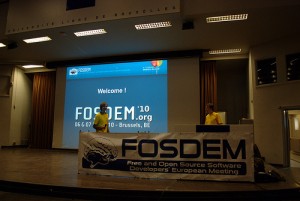 Racing back to Amsterdam at 270 km/h, time to consolidate my takeaways from this year’s FOSDEM in Brussels. More geeks (5,000+ expected), more lectures (200+) and more topics I wanted to follow: succeeded with OpenOffice, Drupal, and CouchDB, but not with Mozilla and XMPP. A geeky overview of my takeaways.
Racing back to Amsterdam at 270 km/h, time to consolidate my takeaways from this year’s FOSDEM in Brussels. More geeks (5,000+ expected), more lectures (200+) and more topics I wanted to follow: succeeded with OpenOffice, Drupal, and CouchDB, but not with Mozilla and XMPP. A geeky overview of my takeaways.
OpenOffice
Already some 5 years ago, we put PDF and Word output of surveys into our WebEnq online survey software, and recently we added more extensive reporting options as well, giving partners in IICD’s Monitoring and Evaluation programme a text document with all major calculations and tabulations already filled in. And right now, Jaap-Andre and Bart are working on a way to generate hundreds of personalised PDF reports from student data on courses they took and evaluated.
In our first approach we worked with Latex, since it offered the kind of formatting options we were looking for (keep a question and all answer options on a single page, for instance). Latex is a complex beast to tame, and the conversion to PDF and Word is far from flawless. Bart found ODTPHP, a library that might help us use OpenOffice documents as reports templates instead, which definitely would help — but again, a lot of functionality to be desired.
Yet, the XML-based ODF standard feels like the best way forward. What I learned at FOSDEM:
- Sun apparently offers a commercial “convertor in a box” to transform documents from one format into another.
- Alfresco seems to have something like that as well.
- The code for OpenOffice is slowly being split to between the filters and the UI parts, to allow headless services to be built more easily.
Bart Hanssens gave a high-level overview of some ODF aspects, with my takeaways:
- ODF version 1.2 is still a draft specification, although OpenOffice 3 already uses it. The book OpenDocument Essentials by J.D.Eisenberg is freely available, and although starting to get outdated, still a good introduction into working with ODF.
- It enables RDF enhanced meta data, XML-DSIG digital signatures, syntax and semantics for open formula, and front-end database functions. All things we could use sooner or later.
- Officeshots.org is a web service to compare document renderings in various word processors (like Browsershots, Browsercam or Litmus app for web pages)
- Apache Lucene has a Tika project to extract metadata and content from “almost anything”: ODF, Microsoft Office, HTML, PDF, mbox, multimedia files, …
- He referred to OSOR, the Open Source Observatory and Repository: a European Union repository of projects aimed at public administrations.
Svante Schubert (Sun) talked about the ODFDOM project:
- ODFDOM tries to break down complexity of getting stuff into ODF, and create testable parts. It separates an ODF schema layer from an ODF package layer.
- They develop the API from test cases and test scenarios, which keeps the discussion about API elements focused on concrete cases with business value, rather than nice designs.
- He also mentioned schema2template, a tool or library to create models from schemas, that enables easier comparison of schema versions.
And he mentioned LpOD, a project about which Jerome Dumonteil (Ars Aperta) spoke next. lpOD is written for Python, Perl, Ruby, and partly focuses on using ODF for XML repositories, more than on individual documents. Think of large multimedia sets like in the Louvres, with combinations of text, film, photo, and so on.
Drupal
The list of takeaways from the Drupal talks I attended is considerably shorter:
- Thanks Károly Négyesi for an update of how Drupal 7 is different from 6. The debate whether Drupal is a CMS or a programming platform will probably not die for a while, and it is interesting to see the direction Drupal is taking, compared to Typo3 (which started by developing a whole new framework for their next version CMS). Given where Drupal 7 and Typo3 5 both are in their development and future direction right now, I think I’ll concentrate on Drupal as the platform of choice.
- Roel de Meester offered a few new tips (masquerade, reroute email, and schema modules), but mostly I’m already using more or less the same toolset he proposed. And together with catching a last bit of the “upgrading” talk, I have to conclude that it’s still mainly a mess to get a real development-staging-live work flow running. DevelopmentSeed seems to be furthest with this.
CouchDB
Stephane Combaudon gave a nice introduction to CouchDB for people used to working with SQL/RDBMS. Document-oriented, working with JSON, RESTful, and then written in Erlang and using MapReduce functions… It definitely seems to make a lot more sense than the current struggle with database tables, but I haven done any functional languages or lambda calculus since my university courses.
No XMPP, no Mozilla 🙁
The XMPP room was full when I arrived there, so I thought I’ll then have a look at Mozilla’s talk about HTML5, but ended up in an even bigger crowd not able to fit inside that room. Mozilla’s update on Thunderbird, on Sunday, turned out to be rescheduled to earlier when I arrived there in time, and Mark Surman’s talk about Drumbeat in Europe was at the same time as a Drupal talk I wanted to see.
So only heard a few things about the XMPP sessions from a friend who did get in, and exchanged a few words with Mark in the hallway, but even our plan to hook up at one of the many parties at night fell through.
Thanks, FOSDEM
Again a year of getting up to speed with the latest and greatest in a short time, in enjoyable Brussels.
